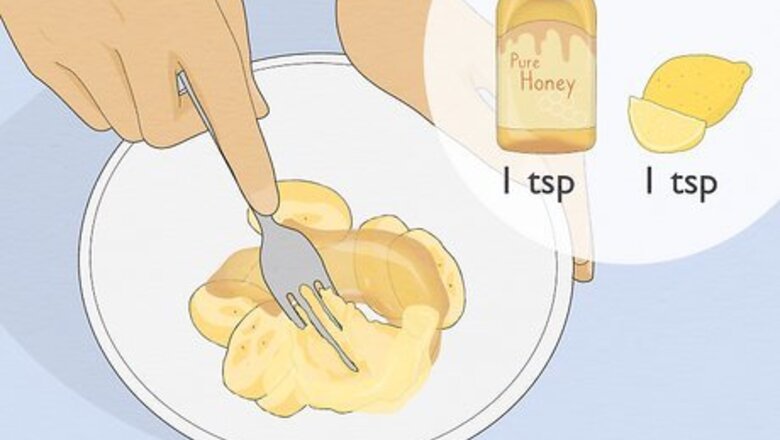
views
Classic Banana and Honey Face Mask
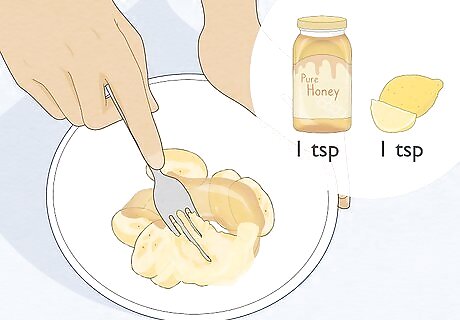
Create the mask mixture. Break a ripe banana up into small pieces, and mash it in a bowl with a spoon or fork until all the lumps are smoothed out. Mix in 1 teaspoon of honey, and 1 teaspoon of lemon juice. Stir all of the ingredients until the are combined completely. The banana provides nutrients for the skin, the honey provides moisture, and the lemon juice acts as a natural astringent and exfoliate. This face mask can be a bit drippy, so be sure to wear clothing you don’t mind getting dirty.
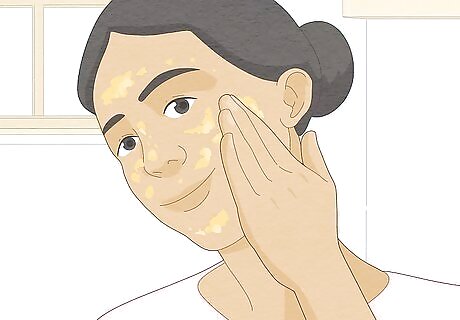
Apply the mask to your face. Rub the banana mask onto your face, using your fingers to massage the mixture all over your skin. Leave the mask on for 10-20 minutes. Make sure your face is clean, and free of any makeup before you start applying the mask. You may need to wash your face with a light soap before you put on the mask to remove any makeup or surface impurities.
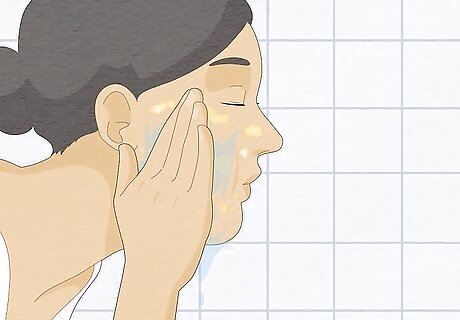
Rinse your face. Rinse your face with lukewarm water, a washcloth, and no soap after the mask has soaked into your skin for 10-20 minutes. You want to clear your face of the banana mask, but you don’t want to wash away its healthy benefits. If you want to use this mask again in the future, make a new batch. Natural face masks like this can usually stay about a week in the fridge, but just to be safe, start fresh every time.
Banana Mask Variations
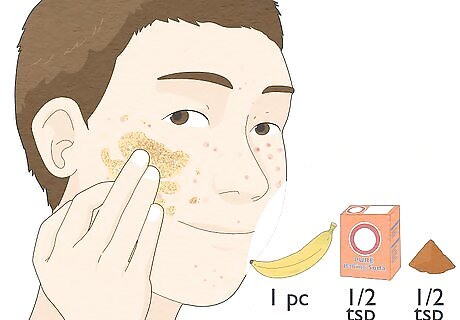
Make a banana mask for acne-prone skin. Mash a ripe banana in a small bowl until it forms a smooth, lump free pulp. Add 1/2 a teaspoon of baking powder, and 1/2 a teaspoon of turmeric powder. Mix all three ingredients until they are blended thoroughly. Apply this mask to your face and allow it to sit on your face for about 10-15 minutes. After it has sat on your face, rinse your face off with some warm water, and pat your face dry with a towel. Since turmeric can stain very easily, consider applying this mask with a make-up brush. That way, the yellow color from the turmeric won’t dye your fingers. You may feel a slight stinging from the baking soda, if you have sensitive skin. However, don’t worry the baking soda doesn’t warrant a serious concern. If you are uncertain how your skin will react to the baking soda, test a small, inconspicuous area of your face first before applying it all over. Try to spread out the use of this mask. Applying this mask 2-3 a week is sufficient. However, try not to go over 3 times a week since this mask is an exfoliating mask and you don’t want to exfoliate your skin too frequently.
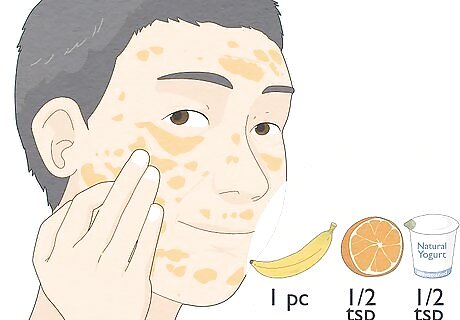
Try a banana mask for wrinkled skin. Combine and mash a ripe banana, 1 teaspoon of orange juice, and 1 teaspoon of plain yogurt. Use a fork to make a smooth and even, consistency. Massage and work this mask onto your face, and let it soak into your skin for about 15 minutes. Rinse off the mask after 15 minutes, and pat dry your face with a towel. The yogurt helps with shrinking the look of pores, and tightening pores. The orange juice helps with refreshing skin cells, and softening harsh skin lines. Try to apply this mask over a sink, so if any spills or drips off your face, you have a convenient area to catch the mask.
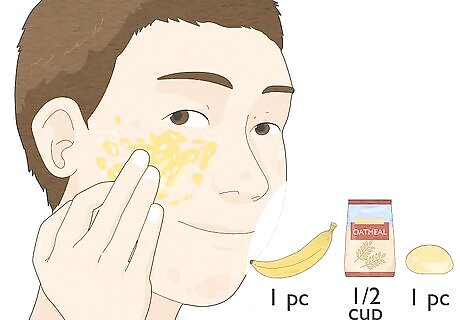
Consider a banana mask for dry skin. Mix 1/2 of a ripe banana with 1/2 cups of cooked oatmeal, 1 teaspoon of honey, and 1 egg yolk in a small bowl. Combine with your fingers or with a fork, until you get a smooth consistency. Apply this mask to your face and keep on for 15 minutes. Rinse the mask off with lukewarm water and pat dry your face with a towel. Be very cautious to not use this mask if you have any poultry or egg allergies. The egg yolk locks in moisture, and helps give your skin a smooth texture.
Honey Mask Variations
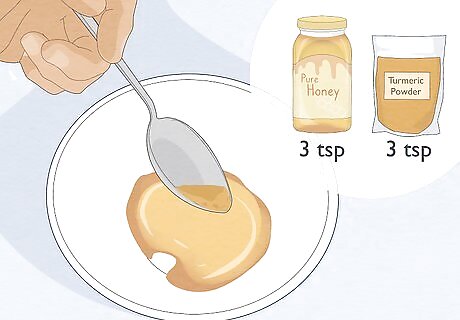
Mix a honey mask for acne-prone skin. Mix 3 teaspoons of raw honey with 1/2 a teaspoon of cinnamon in a small bowl. Apply the mixture to your face and the mask on for 20-30 minutes before rinsing it off with warm water. If you have sensitive skin, cinnamon can cause some irritation. To see if your skin will be bothered by the cinnamon, test the mask mixture on a small patch of skin to see how you react.
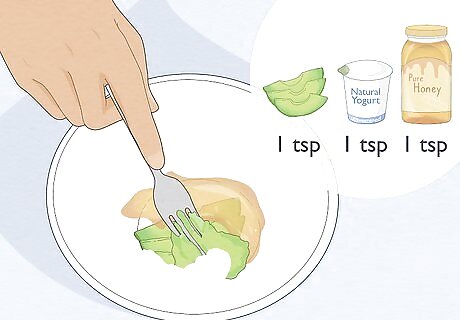
Try a honey mask for dry skin. Combine 1 teaspoon of avocado, 1 teaspoon of plain yogurt, and 1 teaspoon of raw honey in a small bowl. Mix these ingredients with a fork or your fingers until they are smooth. Apply this mask to your face and let it soak into your skin for approximately 20 minutes. After it has sat on your skin for 20 minutes, rinse the mask off with warm water. The avocado fats and the whole milk yogurt fats help to moisturize your skin, while the yogurt’s lactic acid promotes collagen production, and evens out your complexion.
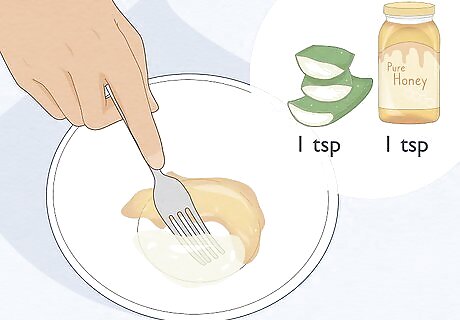
Experiment with a honey mask for sensitive skin. Combine 1 teaspoon of aloe vera with 1 teaspoon of raw honey in a small bowl. Apply the mixture onto your face and leave it for 20-30 minutes. Rinse the mask off with warm water, and pat dry your face. Aloe helps to reduce redness and irritation, which is prevalent with people who have sensitive skin.
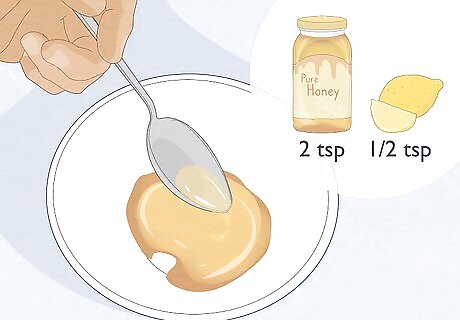
Make a honey mask for dark spots and scars. Mix 2 teaspoons of raw honey with 1/2 a teaspoon of lemon juice. Apply this mixture to your face and let it soak into your skin for approximately 20 minutes. Rinse off the mixture and pat dry your face. Lemon juice is a natural exfoliate that can help reduce the appearance of scars and dark spots on your face. However, remember that you might have to use this mask over a period of time to see a noticeable difference. Lemons contain citric acid which can cause acidic burns if too much is used. If you have sensitive skin, be wary of citric acid ingredients in the masks you use. To make sure you don't hurt yourself, do a patch test of the back of your hand to see how your skin could react. Never use pure lemon juice to treat or cleanse your skin, as this will lead to irritation.




















Comments
0 comment